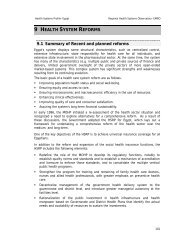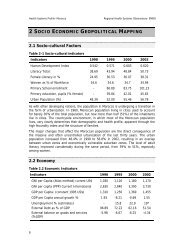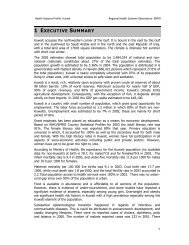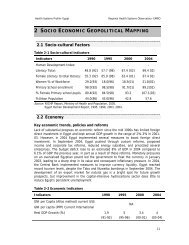The role of contractual arrangements in improving health sector ...
The role of contractual arrangements in improving health sector ...
The role of contractual arrangements in improving health sector ...
You also want an ePaper? Increase the reach of your titles
YUMPU automatically turns print PDFs into web optimized ePapers that Google loves.
Lebanon<br />
Table 5. Scorecard <strong>of</strong> <strong>contractual</strong> <strong>arrangements</strong> <strong>in</strong> Lebanon (cont.)<br />
Contractual arrangement What the arrangement achieves Challenges to meet<br />
6) Maternal services<br />
(Makassed)<br />
7) Primary <strong>health</strong> expertise<br />
(consultants)<br />
8) Programme<br />
management (WHO)<br />
Other public organizations<br />
1) Ambulatory care<br />
(mostly private providers)<br />
2) Hospitalization (Mostly<br />
private hospitals)<br />
• Provide community access to facilities for normal delivery<br />
• L<strong>in</strong>k primary and maternal care<br />
• L<strong>in</strong>k community maternal care and referral services<br />
• Secure public <strong>health</strong> expertise <strong>in</strong> needed areas<br />
• Avoid add<strong>in</strong>g more regular staff<br />
• Ensures proper management <strong>of</strong> important programmes<br />
• Secures WHO expertise and <strong>in</strong>timate <strong>in</strong>volvement<br />
• Reta<strong>in</strong>s primary <strong>health</strong> pr<strong>of</strong>essionals (on WHO pay scale)<br />
• Provide ambulatory care for beneficiary<br />
• Cover all geographical areas<br />
• Beneficiary chooses provider<br />
• Provide hospitalization services to beneficiaries<br />
• Cover all geographical areas<br />
• Beneficiary chooses provider<br />
• Flat rates for many surgical procedures decrease costs<br />
• Supervis<strong>in</strong>g physicians ensure <strong>in</strong>dications, appropriates <strong>of</strong><br />
care, and appropriate bill<strong>in</strong>g<br />
173<br />
• Too early to assess performance and impact<br />
• Ensure quality <strong>of</strong> contributions<br />
• WHO overhead plus additional overhead when consultants are<br />
recruited<br />
• MOPH can <strong>in</strong>dependently manage programmes with support <strong>of</strong><br />
WHO<br />
• Assess impact <strong>of</strong> programmes<br />
• L<strong>in</strong>k programmes with other MOPH activities (e.g. primary<br />
care and hospitalizations)<br />
• Implement primary care model (<strong>in</strong>clud<strong>in</strong>g gate-keep<strong>in</strong>g)<br />
• Prevent abuse<br />
• Monitor and ensure quality<br />
• Assess outcomes<br />
• Control escalat<strong>in</strong>g costs<br />
• Resist political pressures by strong provider groups.<br />
• Coord<strong>in</strong>ate a common contract<strong>in</strong>g mechanism with other<br />
f<strong>in</strong>anc<strong>in</strong>g agencies<br />
• Prevent abuse<br />
• Monitor and ensure quality<br />
• Assess outcomes<br />
• Apply flat fees to all hospitalizations (surgical and medical)<br />
• Resist political pressures by hospitals (e.g. for <strong>in</strong>clusion <strong>of</strong><br />
more hospitals)<br />
• Coord<strong>in</strong>ate a common contract<strong>in</strong>g mechanism with other<br />
f<strong>in</strong>anc<strong>in</strong>g agencies
















